Ferguson anger rooted in racial inequality
Updated: 2014-11-28 07:23
By Chen Weihua(China Daily USA)
|
||||||||
I was walking past Freedom Plaza on Pennsylvania Avenue in Washington on Tuesday afternoon and saw a group of people were staging a die-in. The two dozen young men and women, of all races, were protesting the Monday night grand jury decision in Ferguson, Missouri, not to indict Darren Wilson, a white police officer who fatally shot black teenager Michael Brown in August.
On Tuesday evening, angry protesters in Washington also burned a US flag outside the American Portrait Gallery near Chinatown. Such were just two of the many protests and some riots that have taken place in many US cities in the last two days. Protests have actually never stopped in Ferguson in the 110 days since 18-year-old Brown was shot six times on Aug 9.
The deployment of thousands of National Guard members, the use of tear gas and the hundreds of arrests made by the police also show how tense the relationship is between protesters and law enforcement.
The debates in the United Stated have heavily focused on the loopholes in the grand jury decision, and how truthful Darren Wilson was in telling his story on ABC News on Tuesday. But the outburst of anger across the US reflects only one thing - people's deep frustration with the nation's racial inequality.
While such inequality is masked on the surface by Barack Obama being elected and reelected as the first African-American president, it often quickly reaches boiling point when triggered by incidents such as the ones regarding Brown or Trayvon Martin, a 17-year-old black teenager shot and killed in Florida in 2012.
Obama has tried to highlight the progress of racial relations in his speeches, yet his frustration was apparent when he said in July last year that, "Trayvon Martin could have been me 35 years ago". He expressed similar frustration on Monday night when he said that "the frustrations that we've seen are not just about a particular incident. They have deep roots in many communities of color who have a sense that our laws are not always being enforced uniformly or fairly".
The sad reality is that every African-American, including Obama, has experienced some kind of racial discrimination in their lives. I still recall the story told me by the 16-year-old son of the African-American host family I lived with in Detroit in 1998. An excellent student, he felt deeply hurt and angered to see a white woman suddenly holding her purse tight while seeing him passing by, as if he were a robber.
The family, a middle class one of certified public accountant parents, still talked about how they haven't forgotten the history of slavery suffered by their great-grandmother.
Statistics show that the wealth gap between white and African-American families has tripled in the past three decades from 1984 to 2009. In everything from employment, education and pay to healthcare and home ownership, African-Americans are often at the bottom of society. And while accounting for only 12.6 percent of the US population, African-Americans make up 38 percent of the prison population in the country.
The days when Rosa Parks fought to end segregation may have long gone, yet it's no surprise anymore to walk into many American communities and schools these days to be reminded that de facto segregation still exists widely in a nation which lauds itself for upholding human rights.
In his inauguration speech in January last year, Obama made immigration, climate change, gun control and job creation the top priorities for his second term, he clearly missed that halting the worsening racial inequality should also be high on the agenda. It would be a perfect legacy for an African-American president.
The author, based in Washington, is deputy editor of China Daily USA. chenweihua@chinadailyusa.com
(China Daily USA 11/28/2014 page16)

 Daredevil dancer conquers mountain
Daredevil dancer conquers mountain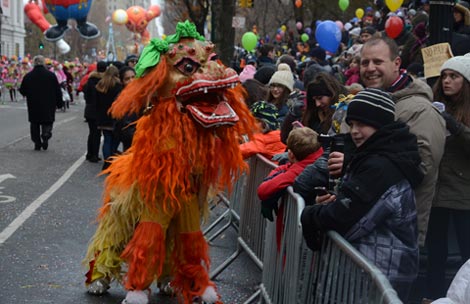
 Chinese float gives joy at Macy's parade
Chinese float gives joy at Macy's parade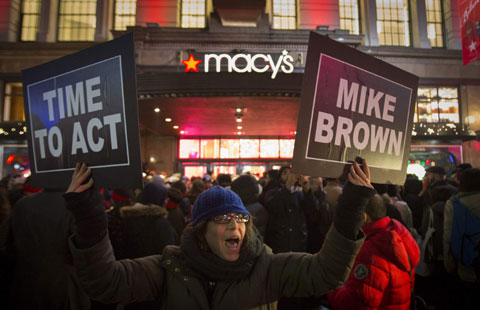
 Calm comes to troubled Ferguson
Calm comes to troubled Ferguson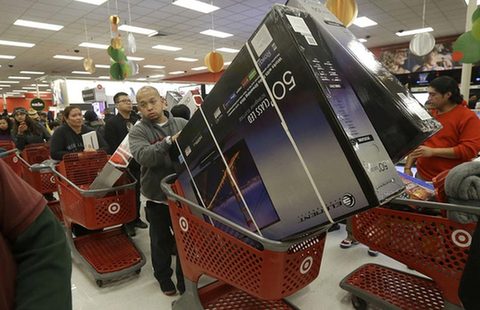
 6 things you should know about Black Friday
6 things you should know about Black Friday
 Visa change may boost tourism to the US
Visa change may boost tourism to the US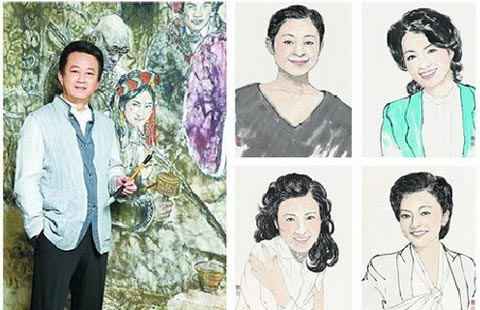
 China's celebrity painters
China's celebrity painters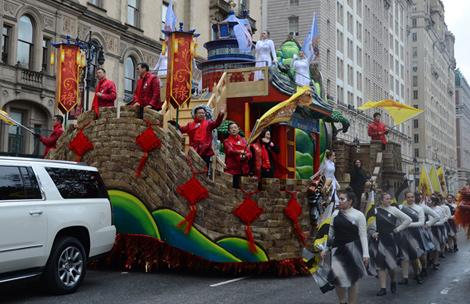
 Beauty of Beijing float making debut in Macy's parade
Beauty of Beijing float making debut in Macy's parade
 Rescue dogs show skills in NW China
Rescue dogs show skills in NW China
Most Viewed
Editor's Picks

|

|

|

|

|

|
Today's Top News
China, US fight terror on the Internet
How to give is focus of philanthropy forum
China, US diverge on approaches to nuclear energy
China's local govt debt in spotlight
Macy's looks to appeal to more Chinese customers
Clearer view of Africa called for
Cupertino, California council is majority Asian
BMO Global Asset Management Launches ETFs in Hong Kong
US Weekly

|

|








